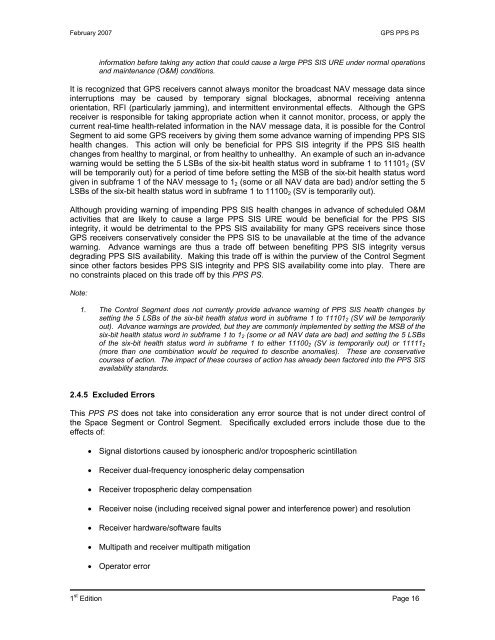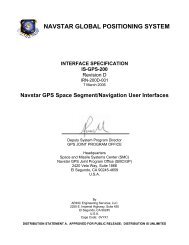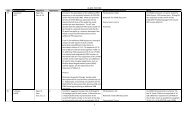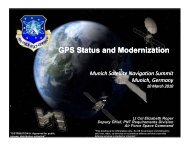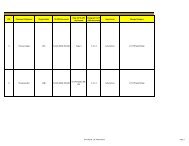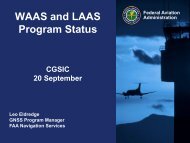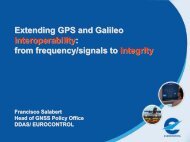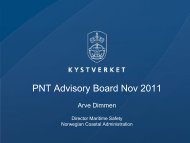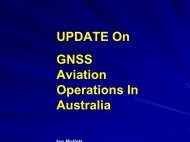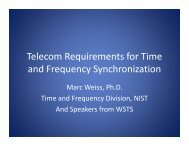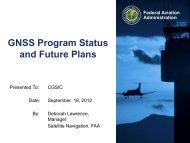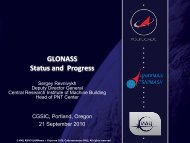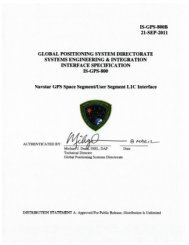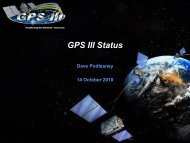Precise Positioning Service Performance Standard - GPS.gov
Precise Positioning Service Performance Standard - GPS.gov
Precise Positioning Service Performance Standard - GPS.gov
Create successful ePaper yourself
Turn your PDF publications into a flip-book with our unique Google optimized e-Paper software.
February 2007<br />
<strong>GPS</strong> PPS PS<br />
information before taking any action that could cause a large PPS SIS URE under normal operations<br />
and maintenance (O&M) conditions.<br />
It is recognized that <strong>GPS</strong> receivers cannot always monitor the broadcast NAV message data since<br />
interruptions may be caused by temporary signal blockages, abnormal receiving antenna<br />
orientation, RFI (particularly jamming), and intermittent environmental effects. Although the <strong>GPS</strong><br />
receiver is responsible for taking appropriate action when it cannot monitor, process, or apply the<br />
current real-time health-related information in the NAV message data, it is possible for the Control<br />
Segment to aid some <strong>GPS</strong> receivers by giving them some advance warning of impending PPS SIS<br />
health changes. This action will only be beneficial for PPS SIS integrity if the PPS SIS health<br />
changes from healthy to marginal, or from healthy to unhealthy. An example of such an in-advance<br />
warning would be setting the 5 LSBs of the six-bit health status word in subframe 1 to 11101 2 (SV<br />
will be temporarily out) for a period of time before setting the MSB of the six-bit health status word<br />
given in subframe 1 of the NAV message to 1 2 (some or all NAV data are bad) and/or setting the 5<br />
LSBs of the six-bit health status word in subframe 1 to 11100 2 (SV is temporarily out).<br />
Although providing warning of impending PPS SIS health changes in advance of scheduled O&M<br />
activities that are likely to cause a large PPS SIS URE would be beneficial for the PPS SIS<br />
integrity, it would be detrimental to the PPS SIS availability for many <strong>GPS</strong> receivers since those<br />
<strong>GPS</strong> receivers conservatively consider the PPS SIS to be unavailable at the time of the advance<br />
warning. Advance warnings are thus a trade off between benefiting PPS SIS integrity versus<br />
degrading PPS SIS availability. Making this trade off is within the purview of the Control Segment<br />
since other factors besides PPS SIS integrity and PPS SIS availability come into play. There are<br />
no constraints placed on this trade off by this PPS PS.<br />
Note:<br />
1. The Control Segment does not currently provide advance warning of PPS SIS health changes by<br />
setting the 5 LSBs of the six-bit health status word in subframe 1 to 11101 2 (SV will be temporarily<br />
out). Advance warnings are provided, but they are commonly implemented by setting the MSB of the<br />
six-bit health status word in subframe 1 to 1 2 (some or all NAV data are bad) and setting the 5 LSBs<br />
of the six-bit health status word in subframe 1 to either 11100 2 (SV is temporarily out) or 11111 2<br />
(more than one combination would be required to describe anomalies). These are conservative<br />
courses of action. The impact of these courses of action has already been factored into the PPS SIS<br />
availability standards.<br />
2.4.5 Excluded Errors<br />
This PPS PS does not take into consideration any error source that is not under direct control of<br />
the Space Segment or Control Segment. Specifically excluded errors include those due to the<br />
effects of:<br />
• Signal distortions caused by ionospheric and/or tropospheric scintillation<br />
• Receiver dual-frequency ionospheric delay compensation<br />
• Receiver tropospheric delay compensation<br />
• Receiver noise (including received signal power and interference power) and resolution<br />
• Receiver hardware/software faults<br />
• Multipath and receiver multipath mitigation<br />
• Operator error<br />
1 st Edition Page 16


